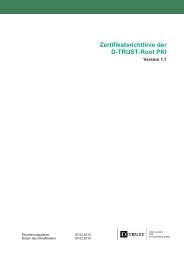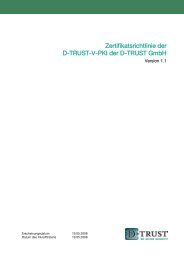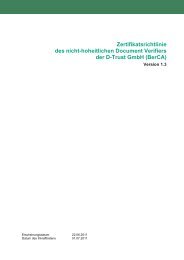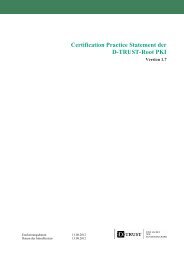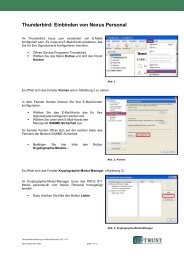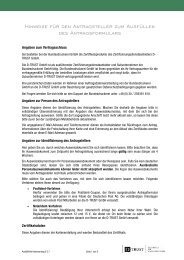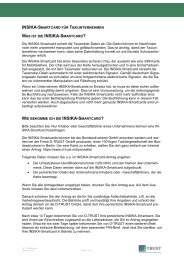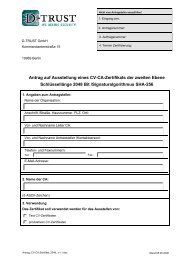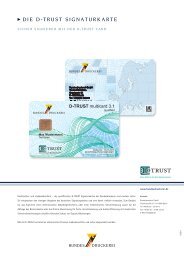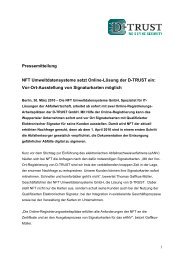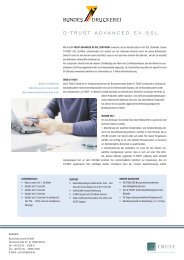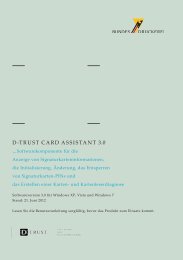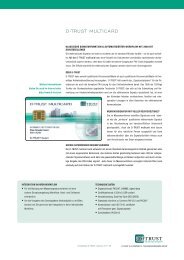D-TRUST-Root PKI Certification Practice Statement
D-TRUST-Root PKI Certification Practice Statement
D-TRUST-Root PKI Certification Practice Statement
You also want an ePaper? Increase the reach of your titles
YUMPU automatically turns print PDFs into web optimized ePapers that Google loves.
D-<strong>TRUST</strong>-<strong>Root</strong>-<strong>PKI</strong> <strong>Certification</strong> <strong>Practice</strong> <strong>Statement</strong><br />
6.2.8 Activating Private-Keys<br />
Private CA-keys can only be activated by at least two attending administrators in the<br />
appropriate roles and only for the allowed use-cases (keyCertSign, cRLSign).<br />
Private EU-keys are activated by the correct PIN input.<br />
6.2.9 Deactivating Private-Keys<br />
Private CA-keys are deactivated upon the disconnection between the utilizing application<br />
and the HSM.<br />
A private EU-key is deactivated by the utilizing application or by the removal of the<br />
SmartCard from the card reader respectively the deactivation or deletion of the soft-PSE,<br />
as the case may be.<br />
A permanent deactivation of SmartCard based EU-private keys ensues after multiple<br />
incorrect PIN inputs. PUK reactivations of a card are numbered and MultipleSmartCards<br />
are not programmed to accept a PUK.<br />
6.2.10 Destroying Private-Keys<br />
Private CA-keys are deleted after their expiration. The keys are deleted from the HSM as<br />
well as from the backup mediums. If an HSM is decommissioned, the private keys are<br />
deleted from it.<br />
If a SmartCard chip is destroyed or the files containing the private EU-key are deleted,<br />
the key is irreparably lost. The destruction of keys escrowed at the CSP may be requested<br />
(according to section 4.12.1).<br />
6.2.11 Appraisal of Cryptographic Modules<br />
The CSP makes use of qualified hard- and software based key-generators to ensure the<br />
quality of EU-keys. The production HSMs are FIPS 140-2 Level 3 certified.<br />
6.3 Other Aspects of Key-Pair Management<br />
6.3.1 Archiving Public-Keys<br />
Public CA- and EU-keys are, conforming to the security concept, archived in form of the<br />
created certificates.<br />
6.3.2 Certificate- and Key-Pair Validity-Period<br />
The validity-period of CA-keys and certificates is variable and may be learned from the<br />
certificates. The maximum validity period is 30 years.<br />
The validity-period of EU-keys and certificates is variable and may be learned from the<br />
certificates. The maximum validity period is:<br />
Class 3-2<br />
61 months, (maximum validity for SSL-certificates is 39 month)<br />
Page 43 of 53



